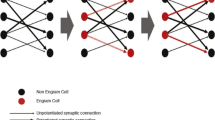Abstract.
The prevailing hypothesis for the formation of long-term memory (LTM) is that introduction of a memory item alters the pattern of existing neuronal connectivity to form a neuronal network that will subserve the information for long-term storage. Modulation of synaptic efficacy is induced by changes in synaptic transmission within selected synapses or alteration in synaptic contacts. These changes are in turn supported by molecules that underlie transmission or synaptic remodeling. It is suggested that modulation of gene expression is needed for LTM formation to overcome the relative short lifetime of proteins in neurons (as compared with enduring memory) [1-3]. One of the most salient results consonant with this hypothesis is that the transcription factor cAMP response element binding (CREB) is involved in the formation of memory in organisms with diverse phylogenetic background from mollusks to mammals. CREB subserves the formation of memories of various types of tasks that utilize different brain structures. Circumstantial evidence is available suggesting that CREB regulates the transcription of genes that subserve LTM. The present review is focused on the CREB protein, its role in memory formation and considers mechanistic models pertaining to CREB action in modulating neuronal networks that underlie LTM.
Similar content being viewed by others
Author information
Authors and Affiliations
Additional information
Rights and permissions
About this article
Cite this article
Lamprecht, R. CREB: a message to remember. CMLS, Cell. Mol. Life Sci. 55, 554–563 (1999). https://doi.org/10.1007/s000180050314
Issue Date:
DOI: https://doi.org/10.1007/s000180050314




